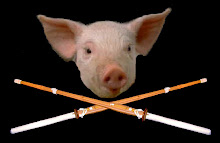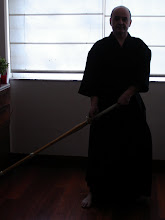Tor Ching Li interviewed Mr. Kubo at his dojo in Tokyo. His responses have been translated from Japanese and edited.
WSJ: How is managing a dojo different from managing an ordinary business or organization?
Mr. Kubo: A dojo is not run for profit. Nor is there the option of closing it if the going gets tough. The spirit of shu [learning and maintaining the right foundation], ha [achieving breakthrough via exploration], ri [to transcend], is central to kendo.
A dojo is not just a place to practice martial arts, but a space where people gather both to enrich and be enriched by the way of the sword. It is sacred without being a religion. During keiko [training sessions] one should give 100%. Good atmosphere and good communications before and after practice is important, and a drink or two helps the flow of conversation. I want my students to feel this is their second home, a place they look forward to after work or school.
WSJ: How did you expand Kyumeikan’s influence globally and what are the challenges of maintaining such a network?
Mr. Kubo: I didn’t set out to establish an international network, but from the start to return the warmth and kindness I received from people I barely knew when I was overseas. I was motivated to do the same for foreigners visiting Japan via my capacity as a kendo dojo director so that they would return home with an equally good impression of Japan.
Free lodging was provided in the dojo for kendo practitioners from overseas who couldn’t find accommodations, and monthly fees were waived for those who couldn’t afford to pay. This is the spirit of managing a dojo.
WSJ: In the past 50 years, how have the challenges of managing a dojo in Japan changed?
Mr. Kubo: The importance of proper manners and societal etiquette is no longer emphasized at home or at school. Thus it falls upon the dojo to nurture respectable people and create a compassionate society. But some kendo dojos are now run merely like a gym, where aside from physical training there is no cultivation of spirit or nurturing of character. Dan gradings used to be assigned by individual dojos to their students, but with the current centralized system, kendo associations decide what dan you get based on a brief match. They profit from the dan examination fees, yet take no action to promote or spread kendo to stop its slide in popularity. This makes them no more than wholesalers of dan certificates.
In the case of Kyumeikan, I worry day and night about how to best utilize our 5,000 yen ($51) monthly student fee to promote kendo, just as real budoshi [samurai peacemakers] did in the Edo era to contribute to society.
WSJ: How do you see the relevance of kendo today both in Japan and the world?
Mr. Kubo: Kendo is at the apex of all forms of budo [martial arts]; it embodies the samurai spirit. People who diligently practice kendo from a young age are well-placed to become respectable members of society, and able to handle challenges thrown up by the world.
Maquetas ultimos trabajos
Hace 2 años





Interesante artículo. Da respuestas a lo que deberia de ser. De todas las maneras no olvidemos un detalle. No somos japoneses, no estamos en Japón y por tanto algunos vemos otras cara al prisma, no mejores ni peores, simplemente otras.
ResponderEliminarEncaixades Mestre